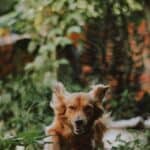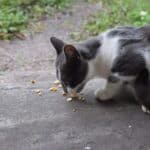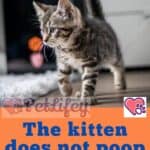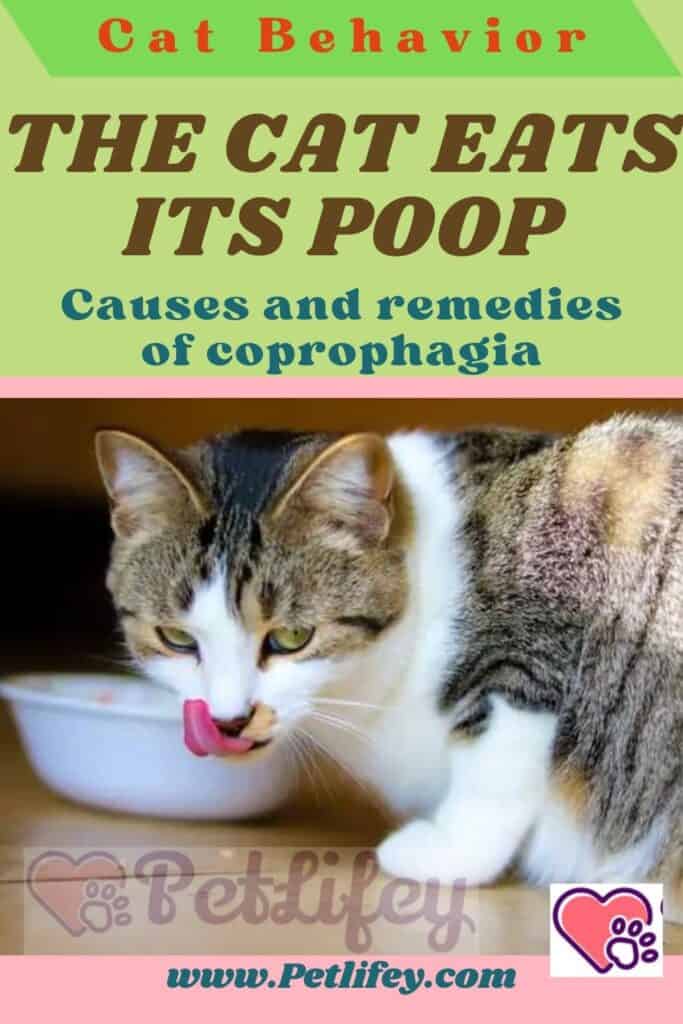
Cats sometimes nibble on objects, large or small. Unfortunately, they also eat their feces. But why does the cat eat its poop? What are the causes and remedies of coprophagia in cats?
There is a specific term to describe why your cat eats poop (your own or another animal’s), and while it’s not necessarily dangerous to the cat, it’s likely unacceptable to you. This behavior of the cat eating its feces is called coprophagia, as we saw for the article on dogs.
What is coprophagia?
This particular condition usually occurs in puppies, as they mimic the behavior of mothers ingesting their puppies’ droppings. Puppies tend to get through this phase as they grow up. On the other hand, if this behavior were to occur in the cat’s adulthood, it could be due to a pathological or functional problem. There are three types of coprophagia:
- autocoprophagia, when they consume their own feces;
- interspecific coprophagia, when they eat the excrement of another animal of the same species;
- interspecific coprophagia, is when the animal eats feces of another species.
Causes
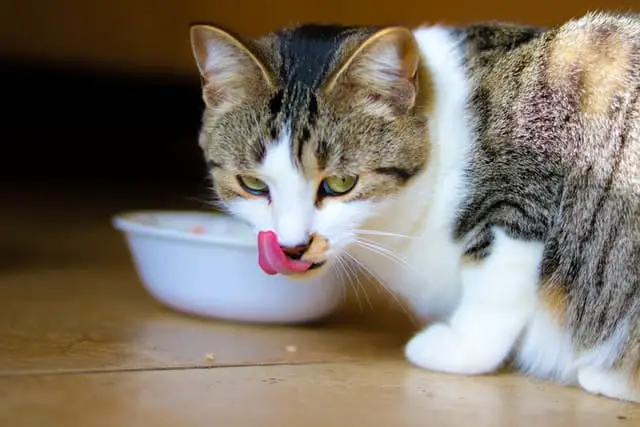
The causes of this disorder are not very clear to scientists. Several experts have proposed various explanations, but none have proved correct or entirely wrong. Some specialists suggest that a particularly poor cat’s diet causes the cat to need to eat more food, produce more feces, and then eat it, as the animal believes it is its missing food ration.
Another cause is the possible presence of internal parasites such as tapeworms, which is why the cat does not absorb nutrients and vitamins. The cat instinctively searches other animals for necessary nutrients and finds itself eating its feces with parasites.
It is important to take into account the misbehavior that cat owners take, as if the animal’s muzzle is rubbed on the feces as a sign that it has done something wrong, it happens that they eat it to avoid another reprimand.
Similarly, other cat problems such as: stress, boredom, depression or neglect can also cause this action. In any case, the animal must be stopped in some way as in this way it could only run into parasites and bacteria such as the dangerous Toxoplasma gondii, responsible for toxoplasmosis.
Some experts believe that coprophagia occurs more frequently in animals that live in relatively arid and poor environments, are often confined to small areas, or receive little attention from their owners.
Coprophagia in cats is rare but can occur. Since coprophagia is a behavior that is well understood, stopping cats from this habit may require the assistance of an expert in animal behavior who works individually with the owner and their pet.
Several specialized behavior modification techniques may be needed to address this problem.
Other causes for which the cat tends to eat its poop are due to possible diseases of the animal as there is often an increase in appetite. The diseases we are talking about are:
- diabetes
- Cushing (or hyperadrenocorticism)
- Cat thyroid problems
- gastritis
Is it right to punish the cat?
In general, punishment that is the one that comes directly from you, such as verbal reprimand is not effective because your cat. With that type of punishment, many pets learn to refrain from behaving when the owner is present, but they continue to do so when they are not alone.
Punishment after wrongdoing is never useful. Animals don’t understand that they are being punished for something they did hours, minutes, or even seconds ago. This approach will not solve the problem and is likely to generate fear or the cat will become aggressive.
Can a change in diet cause a cat to stop eating poop?
To combat and prevent coprophagia, quality nutrition for the cat is essential. Avoid providing very cheap foods as they are often too full of carbohydrates and contain low quality protein in their composition (which will not be used well and will go directly to the stool).
Together, these two characteristics make the poop very palatable for the cat and also facilitate the habit in some way. A good solution to stop your cat from eating poop is natural raw food. This diet has excellent digestibility.
The result is dry, low volume and odorless poop. In other words, it does not arouse interest in the cat, but it is vital that you speak to a veterinarian before making a diet change to ensure that all foods chosen are appropriate and that nothing is detrimental to the health of the coat.
After all, is it normal for cats to eat their own poop?
Coprophagia is certainly not a pleasant habit for us, but it shouldn’t be a cause for agitation either. In some ways, it is normal for a cat to eat poop and in general it is not harmful. But it is possible that some microorganisms, such as viruses, bacteria and parasites, are ingested when the animal eats the excrement.
And so the cat that eats the poop could catch an infection or even have a new disease. But if the cat is free from infectious diseases, he is accompanied by a veterinarian and is often checked for parasites anyway. Logically the feces, the risks of contamination are minimal.
Coprophagy treatment
In the market there are countless products for the treatment of coprophagia. It will be enough to buy it until the animal can definitively overcome this practice which is usually very unpleasant for humans.

